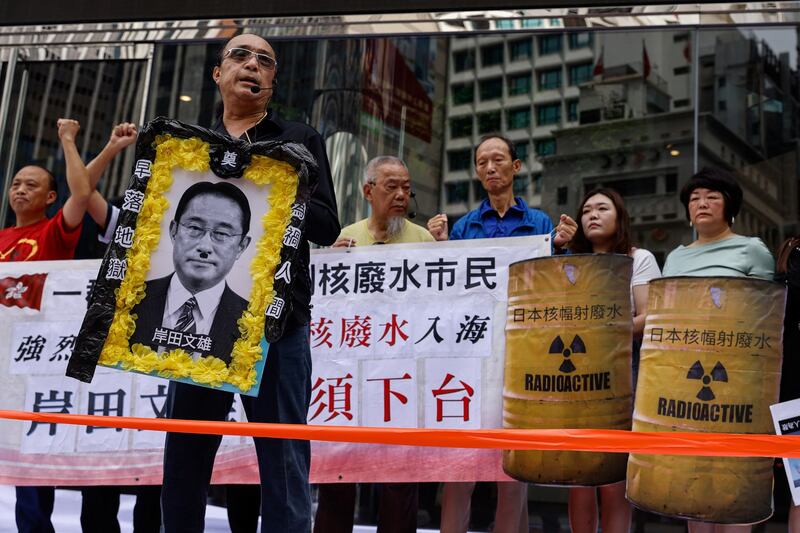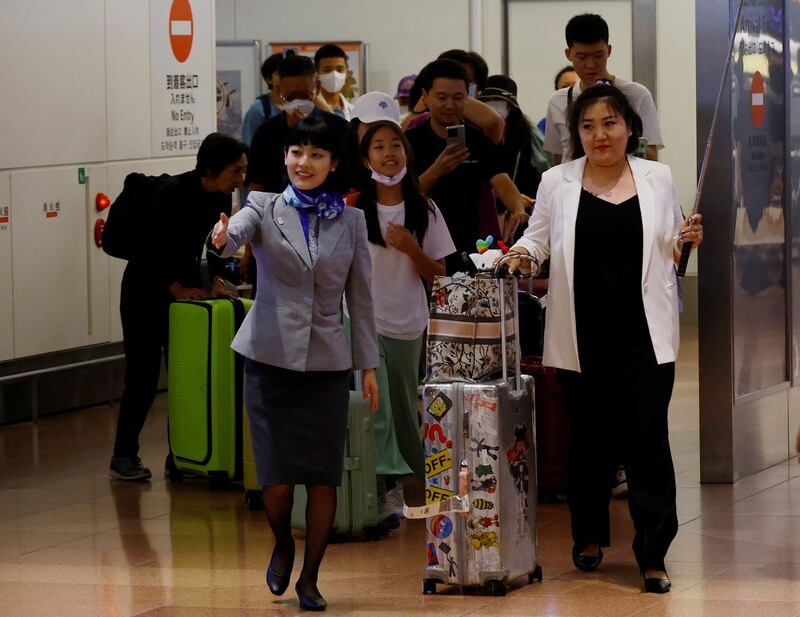Chinese shoppers are panic-buying salt amid concerns that the release of treated radioactive wastewater from Japan's damaged Fukushima Daiichi nuclear power plant could affect future availability.
Yet at the same time, tourism indicators show that Chinese look set to flock to Japan following the lifting of their government's pandemic ban on group tours to multiple countries.
Japan has started the gradual release of treated radioactive wastewater from the nuclear power plant – crippled after the March 11, 2011, tsunami – into the Pacific Ocean, despite regional and local concerns. The water was used to cool melted reactor cores and stored in huge tanks before being treated.
While the plan meets international safety standards, the Chinese government warned of a "secondary disaster" from the move and has banned imports of Japanese seafood and other aquatic products.
"There could be a man-made secondary disaster to the local people and the whole world if Japan chooses to dump the water into the ocean just to serve Japan’s selfish interests," Chinese foreign ministry spokesman Wang Wenbin told a regular news briefing in Beijing on Thursday.
Apparently shoppers feared that the release would taint salt collected from the ocean or restrict future supplies.
‘No need to hoard’
"This kind of panic is unnecessary," said an article in the government-backed Economic Times newspaper, trying to calm fears. It said that China gets around 87% of its table salt from mines, and just 10% from the sea.
"There is enough edible salt produced in China to meet demand, so there is no need to hoard it," the paper said in an opinion article on Friday.
【中国大肆宣传日核废水致癌致畸】
— 自由亚洲电台 (@RFA_Chinese) August 25, 2023
【中国各地掀抢盐浪潮】
日本福岛第一核电站的核处理水排入大海,中国大肆宣传“核污水排海可致癌致畸”等负面消息,中国人担心盐被污染,各地掀起抢购食盐的浪潮。#抢盐 #核废水 pic.twitter.com/QgTMA9CPp7
Photos and video uploaded to social media platforms showed shoppers fighting over bags of household salt, and empty shelves where salt was once stacked in supermarkets in Beijing, as well as in Zhejiang and Shandong provinces.
"People started panic-buying salt in a lot of places yesterday afternoon," a resident of the eastern Chinese province of Jiangsu who gave only the surname Zhang for fear of reprisals told RFA Mandarin.
"[The release of wastewater] isn't going to affect the average person in China, who can just avoid eating their seafood," he said.
A former government official in Beijing who gave only the surname Wu added: "It's going to take 20 to 30 years for Japan to release all of that water into the sea -- are they going to spend the next 20 to 30 years fighting over salt?"
Meanwhile, Fukushima topped the list of the hottest searches on the Weibo social media platform.
Destination: Japan
At the same time, industry indicators showed that Chinese tourists look set to flock to Japan in the coming weeks following the lifting of their government's pandemic ban on group tours to multiple countries.
"Most Chinese people don't seem to care about [the Fukushima wastewater]," a Japanese journalist who declined to be named, giving only the nickname Harada, told RFA Cantonese. "Yet the Chinese government's approach is contradictory – on the one hand they ban imports of aquatic products, and on the other, they lift the group tour ban. It's very strange."

Japan ranked fourth among planned destinations this year after Hong Kong, Macau and Thailand, the Japan Times newspaper quoted Chinese market research firm Dragon Trail International as saying.
Keyword searches for destinations in Japan have skyrocketed since the Ministry of Culture and Tourism lifted a pandemic-era ban on group tours to the country, according to China's Ctrip travel website.
Meanwhile, Trip.com bookings around the Oct. 1 National Day holiday week for regional destinations including Japan, Hong Kong and South Korea are currently around 4.5 times higher than for an average week in July, the Nikkei Keizai Shimbun reported on its Chinese-language news site.
While the ban didn't apply to individual travel, it had a massive impact, and airline and railway share prices jumped on the Tokyo stock market after it was lifted.
In 2019, some 9.6 million Chinese visitors visited Japan, spending around ¥1.77 trillion, accounting for one third of total tourist spending, according to figures from the Japan Tourism Agency.
Just over half a million Chinese nationals went to Japan in the first half of 2023, compared with 4.5 million in the first half of 2019.
Rebound prospects
In Hong Kong, Steve Huen, whose EGLTours company specializes in packages to Japan, said his company had noticed a 20% drop in bookings for Japan on Wednesday, when the plans to release wastewater from Fukushima were announced.
In an interview with government broadcaster RTHK, Huen said he expects demand to bounce back in "two to three weeks," however.
"I don't think these birth pangs will last too long," Huen said. "The water is flowing out, so it's not just in Japan, and fish swim around, so people will keep signing up [for tours]."

The prospect of a rebound in Chinese tour groups visiting popular attractions and beauty spots may be a boost to Japan's tourism sector, but is unlikely to result in the kind of shopping frenzies seen before the pandemic, analysts told Reuters.
A weakening yen has already helped to make Japan a top-five destination for tourists from Taiwan.
Yet while the weaker yen has sparked a rebound in U.S. and European tourism that is exceeding pre-pandemic levels, the exchange rate is less of a draw for Chinese tourists, whose own currency is also weakening, Reuters quoted CLSA Japan strategist Nicholas Smith as saying.
Additionally, "there have been changes over the last few years to their ability to buy Japanese products in China, so they don't actually have to travel to do it," Smith added, referring to the proliferation of shops selling the same goods in China.
The Japan Tourism Agency has vowed to boost inbound tourism to pre-pandemic levels by 2025, while the government will maintain its existing goal of an annual 60 million foreign visitors by 2030.
Translated by Luisetta Mudie. Edited by Malcolm Foster.
